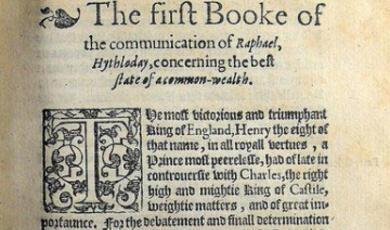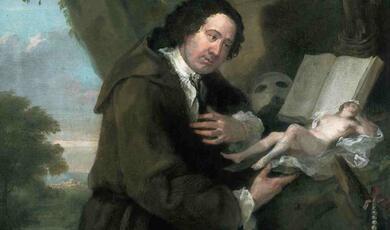6 May 2011
Money and Mathematics
Luke Hodgkin
We all know that the Greeks invented money and then invented mathematics, and the application of money to mathematics has landed us all in our current economic mess. In a sense, the Greeks are to blame for all that.
“Where did Greek mathematics come from?” is my theme, and it is an old theme that a lot of people have talked about; it is a hopeless question, but there is no harm in posing it again. As Mao said, “Where do correct ideas come from?” and he gave the three, obvious answers: scientific experiment; the struggle for production; and the class struggle. What he did not mention was taking somebody else’s correct ideas, which is the fourth way that you can get a correct idea.
Where did Greek mathematics come from then? Well, there is any amount of speculation. I want to talk about two heretical speculations which get currency from time to time, to be dismissed, and the first one is a very old one. It was floated, in the first place, by Herodotus, and Aristotle, and more recently, by Martin Bernal.
What do you mean by Greek mathematics? The Greeks, or some Greeks, claimed that they had got it from Egypt. Martin Bernal writes:
“[I]t would seem difficult to argue that before the second half of the fourth century B.C. any aspect of Greek “science” - with the possible exception of axiomatic mathematics - was more advanced than that of Mesopotamia or Egypt.”
It is an interesting quote because he points out that Greek science, with the possible exception of axiomatic mathematics, was up there with the science of Egypt. As one of his detractors pointed out, that is quite an exception. To except axiomatic mathematics is to except what the Greeks were seriously good at, so if you grant that exception, you give away a lot of ground. So, what are you talking about when you talk about Greek mathematics? As Reviel Netz and others have shown, Greek mathematics used to be thought of as one thing but is more diverse than we had thought.
The second heretical theory I want to raise is one which is much less often realised, but which I like. It goes back to the fact that, around the same time as they invented mathematics, the Greeks also invented currency. Alfred Sohn-Rethel, one of the Frankfurt School Marxists, thought about this and produced a very fine book called Intellectual and Manual Labour, in which he claimed that both Greek mathematics and Greek philosophy derived their abstract form from the idea that the introduction of currency forces you to lose the particularity of any object within exchange. As people, as the Greeks said, you stop talking about sheep numbers and ox numbers and you just talk about numbers. Sohn-Rethel wrote:
“We reason that this [abstraction] could result only through the generalisation intrinsic in the monetary commensuration of commodity values promoted by coinage.”
That is some rather heavy theory and there are pages and pages of it, so i cannot hope to summarise Sohn-Rethel’s arguments to you today. Even so, I shall just call your attention to the coincidence of time and the similarity of mental operations in constructing the market and in constructing mathematics. I shall try and move on to an example a little later.
Sources can be problematic, as Serafina Cuomo has already demonstrated in her lecture today. I have always been a great fan of the National Curriculum, which demands that students of History should “place events, people and changes into correct periods of time” and be taught how to find out about the events, people and changes “from an appropriate range of sources of information”. Now, what is “an appropriate range of sources of information” in the case of Greek mathematics? Our problem is that we have got one kind of source and we have not got another kind of source.
As a result of this, as well as other prejudices (coming from Aristotle or Plato or both of them), there is one thing that is seen as Greek mathematics, and it is essentially geometrical and deductive. I do not think that this idea is entirely wrong, but it is only part of the picture.
Reviel’s excellent first book, The Shaping of Deduction in Greek Mathematics, set up a neat framework in which he showed that there was such a study as Greek mathematics, which was not like anything else. It might be said to be more diverse than we thought, is based on the lettered diagram, and he gave a neat argument that dates it back to the time of Hippocrates of Chios.
Here is our first source of real Greek mathematics. This is an Oxyrhynchus Papyrus with Euclid 2.5, and it is a very neat diagram. It is interesting that fairly straightforward people in Egypt – we do not know who – thought it was worth copying down a Euclid proposition on a piece of papyrus. It is obvious that some serious Greek mathematics was in circulation, but because of the problems we face with papyrus as a source, we do not know a great deal about that.
This mathematics is not the mathematics of numeracy. It is not what I would call demotic mathematics, the mathematics of surveyors and accountants, the mathematics of sums. And that is good mathematics too, of course. Greek mathematics includes sums. Greek mathematics includes the work of surveyors. As Serafina pointed out, there were Greek surveyors and Greek accountants, as well as Roman ones.
This is a picture showing a bit of a survey, reproduced from David Fowler’s book The Mathematics of Plato’s Academy. It is a terrific book, which constantly gives me new insights into Greek mathematics. A couple of days ago, I found that David was claiming that Socrates had a method of calculating the cube root of two, and that you could read that in his account of things in The Republic. I really admire somebody who can say something like that! And it may be true. How do we know? How do we know anything that we know about Greek mathematics? A lot of the time, we have to rely on ingenious reconstruction. What emerges from Fowler’s book is the idea that there is more of a connection between demotic mathematics and the serious theoretical mathematics of, say, Euclid or indeed Hippocrates than we think.
As we can now see, demotic mathematics fits easily into the thesis of Herodotus and Bernal. You can see an almost seamless transition, from Egypt to Greece, of a kind of calculation of measuring fields and doing accounts. Herodotus does not say “We got the logical deductive method from the Egyptians”. He says “We got how to measure fields from the Egyptians”.
The existence of a break, in which some sort of abstract argument, some sort of logical, deductative argument comes, is crucial for Sohn-Rethel’s theory. Do we think that there was such a break? It looks as though there was, although I would again argue that it was quite varied.
Now, it is time to produce a few examples. You may think of different examples. I shall start with doubling because it lies at the beginning of what we think about generally. There are two well-known examples of doubling in Greek mathematics: one is Plato’s Meno, where you double a square. Interestingly, you double a two-foot square – that is, you have got numbers in there. Why are the numbers there? Why is it a two-foot square? Why is it not just a square? It is there so that the slave boy can make mistakes and say, “What about four?” and “What about three?” and so on. But, is this logical deductive mathematics? In a sense, yes, but in a sense, no. In a sense, it is an abstract argument, because you cannot actually arrive at a number.
But we know that the Babylonians knew what the diagonal of a square was, I think we can bet that Egyptians knew what the diagonal of a square was, and I think that we can be pretty sure that Socrates knew what the diagonal of a square was. It is just that that was not what he was interested in when he was writing the Meno, or Plato was writing the Meno.
I think that the Egyptians, and the Delions, the people from Delos, could very likely have worked out the cube root of two as a fraction (go back to my remarks about David Fowler). I think that working out the cube root of two as a fraction is not beyond people, but that is not what many of the Greeks were doing. That is not what Hippocrates did, and that is where Hippocrates comes in again as a founding figure. Hippocrates said that it was a question of constructing two mean proportionals, and I think it was Reviel who said, “What the hell is he on about?” When you are constructing two mean proportionals, what is equivalent to what?
Let us return to Ancient Egyptian mathematics as it was in the sixth century BC. We have no idea what this mathematics was, but we can quite safely assume that it was not at very much like Ancient Greek mathematics. Hippocrates’ reduction and Menaechmus’ solution of the problem of doubling the cube are not the kind of thing that an Egyptian would have come up with, but I think an Egyptian might have come up with the following, or they would have understood what was being got at.
This is the well-known machine devised by Eratosthenes, who did away with constructions using conics and so on. Instead, he showed that you could double your cube by building a machine like this and fiddling around with triangles.
What has this got to do with the currency or the coinage, or capitalism? You might want, and Eratosthenes is quite explicit about this, to double the size of weights and measures. If you have a mould for a one drachma coin, you might want to make a mould for a two drachma coin, and you might want the two drachma coin to contain twice the amount of silver that the one drachma coin contains - how much bigger would it have to be? Eratosthenes would tell you how to do it. I think that this is the kind of mathematics that some of the Greeks thought of, and which was also not outside the horizon of some Egyptians. There is more interplay between those two ways of thinking about mathematics than we think.
I am now going to come on to something that is seriously different, the trivial proposition of Euclid 1.35. You have two parallelograms with the same area. If you read the proposition, from beginning to end – it is not very long – you will see that Euclid has not defined area. You do not know what the area is, of course, and the reason why they have the same area is something to do with having added and subtracted congruent triangles. Now, congruent triangles are the same in a totally different way from the way in which parallelograms of the same area are the same. He is going back to the common notions and making (you could say) a pun on the word “equal”, or simply saying what he means by “equal” – I think that is probably a fairer way of looking at it. He is saying “I mean by “equal” equal in the sense of the common notions”, that is, you can add or subtract equals and what I mean by “equal” is a) equal congruent triangles and b) something to which you can add or subtract congruent triangles. But he has not said that, and you would need somebody to help you with that. I think that relates to the exchange of distraction, in a certain sense – that is that, in some way or other, you have produced an abstract idea of equality for parallelograms, which is illuminated by a remark quoted by David Fowler from Proclus:
“It may seem a great puzzle to those inexperienced in this science that the parallelograms constructed on the same base should be equal to one another.”
Fowler makes it clear that this is no longer a puzzle to us. It is a puzzle if you are a surveyor used to finding the areas of quadrilaterals by using a surveyor’s rule, which is a good way of cheating your taxpayers. In any case, in some sense or other, Proclus finds this is a surprising proposition. Therefore Proclus, writing some 900 years later, still finds Euclid’s definition of area a puzzle. That is interesting.
I think, therefore, that this is an example of a different kind of mathematics, while some of the examples of duplication that I gave are not. They are only “half examples” of a different kind of mathematics. Sometimes we get an example of something that is really different and sometimes we do not.
What one might find surprising, I suppose, is the fact that if you are talking about exchange abstraction - currency, money and so on - why is Greek abstract not more concerned with numbers? I shall leave that as a sort of question mark. Of course, we know that numbers are involved. Heron’s theorem has been referred to, which is of course very interesting because you are simultaneously surveying and producing a Euclidian proof – that is, you prove that your surveying formula is accurate and then you give an approximation to how to work it out. Heron is an extraordinarily interesting source, but he is unlike anybody else.
The quadrature of lunes is another example of the exchange abstraction. It is always regarded as the point at which Greek deductive mathematics starts off, if you discount all the stories about Pythagoras and things like that. It is the earliest reliable story, in some sense, of something that happened in Greek mathematics. And what it says, in my interpretation, is that you can exchange two very different things for one another. You can exchange a round area for a triangular area. This explains the kind of problems that people had about squaring the circle and so on, but it must have seemed wonderful that you could exchange exactly a crescent for a triangle.
There is more diversity in Greek mathematics than once thought. There is what I have called the demotic mathematics. There is the mathematics of surveyors and accountants and so on. There is the pure demonstrative mathematics, at the other extreme, wherever you like to locate that. There are those peculiar kinds of construction that are later found to work, such as Eratosthenes’ construction. There are certain things that Reviel Netz calls ludic – I am thinking of the sound reckoner and the cattle problem as things that are dealt with in a demonstrative way by extraordinarily respectable mathematicians, but have nothing in particular to do with the geometric tradition. There is Heron, and there is astronomy, and I have not finished there.
So, whose pursuit is mathematics? The following quotation from Aristotle is well-known:
“Hence when all such inventions were already established, the sciences which do not aim at giving pleasure or at the necessities of life were discovered, and first in the places where men first began to have leisure. This is why the mathematical arts were founded in Egypt; for there the priestly caste was allowed to be at leisure.” (Metaphysics, I,i.)
This is the other quote about getting mathematics from Egypt, and I like it because it is a complete lie. Here is Aristotle saying that mathematics came from the priests because they had leisure time. Now, it was not the priests who did mathematics in Egypt. We know it was the scribes, and the scribes had very little leisure – they were kept scribing all the time. Any psychoanalytic reading would see Aristotle projecting his own leisure onto the Egyptian priests and saying “You can do mathematics if you have leisure and I have it”, and you have to have a caste who have leisure, and we (the Greeks) have one.
My essential point is that the developments in Greek mathematics were varied, and we are still learning the skills to talk about them. I am not going to provide a conclusive answer, I rather wanted to raise the different possibilities, and there are of course others. Geoffrey Lloyd thought that it came from people having conversations with one another in Greek city states. It might have come from that too. Its relation to abstraction is a difficult one because, of course, our sources are so propagandist and Platonic, and there is so much that we do not have, but we cannot spend our time lamenting that. We have to work on what we do ahve, and I think that there are some very good people around doing work on this material, and I am very grateful to them for providing me and the rest of us with the material that we have to think about.
© Dr Luke Hodgkin, 2011


 Login
Login







